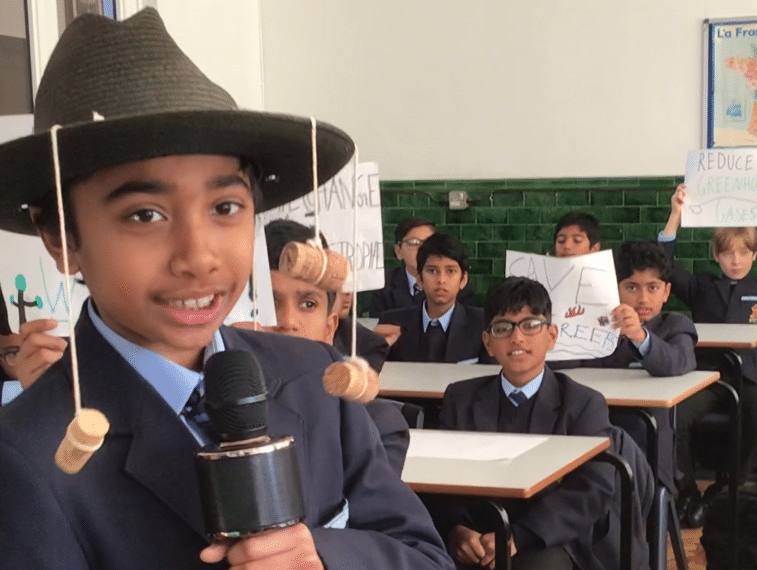
Hundreds of QE boys got to grips with the complexities of competing priorities around the world as they battled to solve the climate crisis at the School’s mock COP26 Summit.
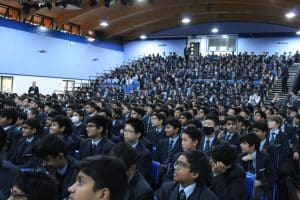 All boys from Years 7–10 took part, with each form group representing a country, producing a short video and putting forward a delegate in the debates. These delegates fought their corner passionately, challenging each other’s records – although perhaps not always with the delicate diplomacy expected at a global summit!
All boys from Years 7–10 took part, with each form group representing a country, producing a short video and putting forward a delegate in the debates. These delegates fought their corner passionately, challenging each other’s records – although perhaps not always with the delicate diplomacy expected at a global summit!
Afterwards, mock summit organiser and Extra-Curricular Enrichment Tutor Stephanie Tomlinson, who is leading the School’s Eco-Network, reflected on the success of the afternoon event, which was held in the Shearly Hall. “The boys really embraced putting themselves in the shoes of their given nation, teasing out the tensions between economic development and sustainability, and nations’ relative contributions toward present and historic warming.
“Delegates effectively made the case for working together, heeding pleas from the likes of the Marshall Islands for concerted action before they were submerged by sea level rises.
“Overall, facts and figures were commanded well and it was great to see boys from Year 7 holding their own against those in Year 10.”
The afternoon was hosted by School Captain Siddhant Kansal and the two Senior Vice-Captains, Sultan Khokhar and Paul Ofordu, all of Year 13.
Several other sixth-formers took part in a panel that directed discussion, challenging the delegates and making suggestions to facilitate debate. The panel members were: Vice-Captains Aadarsh Khimasia and Mark Markov, of Year 13, and Eco-Ambassadors Theo Mama-Kahn and Amogh Bhartia, of Year 12.
The videos produced by each form group about the position of their given nation were judged as part of a House competition. Harrisons’ House won this competition, with its films collectively adjudged to be the best overall. Pictured, top, is a scene from the Year 7 Broughton video: the form were representing Australia.
 Nations had been put into thematic groups – focusing on areas such as cities, forest, or oceans – and urged to discuss, to negotiate and to attempt to come to a joint decision. Each nation then had the opportunity to speak, with many focussing, on the one hand, on their own context – including their level of economic development and current pollution levels – and, on the other, making the case that their own climate targets (such as net zero carbon dates) were, in fact, ambitious.
Nations had been put into thematic groups – focusing on areas such as cities, forest, or oceans – and urged to discuss, to negotiate and to attempt to come to a joint decision. Each nation then had the opportunity to speak, with many focussing, on the one hand, on their own context – including their level of economic development and current pollution levels – and, on the other, making the case that their own climate targets (such as net zero carbon dates) were, in fact, ambitious.
Crispin Bonham-Carter, Assistant Head (Pupil Involvement) said: “The aim was for the debate to look firstly at how countries were delivering on their previous climate objectives and then to examine what further actions they could take, both in terms of mitigation and adaptation.
“I was pleased to see that the discussion did, in fact, cover a range of issues and themes, from deforestation and protecting forests, to the use, or abandonment, of coal.
“And just as we saw in the actual summit in Glasgow, there was a significant amount of wrangling between nations with respect to aid and financial support: smaller, low income, and less polluting countries repeatedly threw down the challenge to the larger, wealthier nations to provide financial support, arguing that they were not going far enough with this, nor with actions to limit and reverse carbon emissions.
“Countries like China then argued that they were still developing, having only seen rapid growth over the last 40 or so years, compared with Britain, where the Industrial Revolution took off more than two centuries ago. Other nations remarked that it was good to see the Chinese delegate in attendance(!), but were critical of the country’s record.
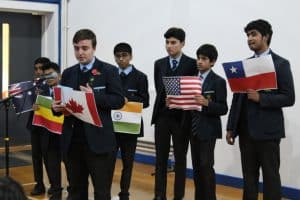 “China’s delegate did, though, make a powerful argument that a significant proportion of China’s emissions were producing and exporting products being bought by those in other parts of the world (including the West), who were, in effect, therefore outsourcing their emissions.
“China’s delegate did, though, make a powerful argument that a significant proportion of China’s emissions were producing and exporting products being bought by those in other parts of the world (including the West), who were, in effect, therefore outsourcing their emissions.
“There were examples of co-operation, with, for example, the UK working with Brazil to support the reversal of deforestation in the Amazon and an offer from Saudi Arabia to Canada to provide lower oil prices in exchange for support with renewable energy.”
In his concluding remarks, panel member Amogh Bhartia, who is a member of the London Schools Eco-Network, said the mock COP26 had shown boys the challenges of reaching international consensus. Events such as the Glasgow summit and the protests of climate activists could sometimes feel distant in terms of boys’ daily lives, he acknowledged. But such an impression was false, he said, and he urged pupils to take grassroots action, such as campaigning in school, organising a clothes swap, writing a magazine article or penning a letter to their local MP.
“If you can do that, and collaborate with others, then we will see change in our community – a change that will inspire others…Be the first and others will follow. Be the first, and inspire the change that our planet desperately needs.”

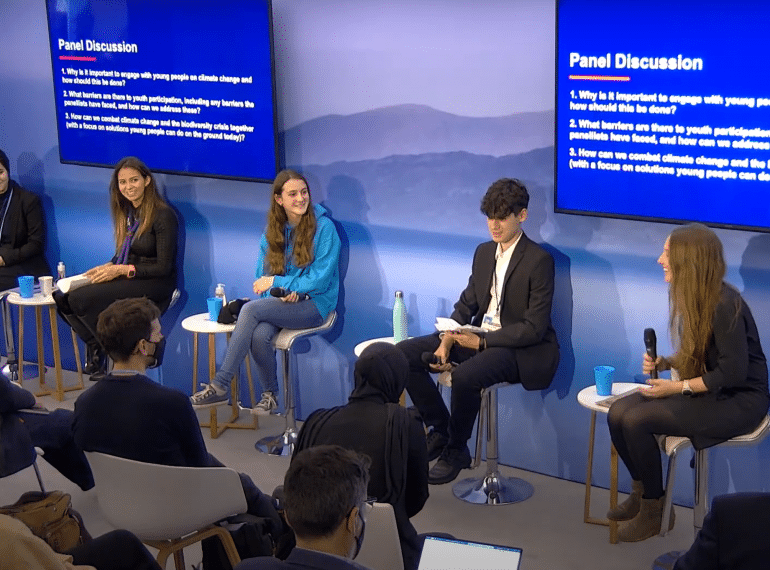
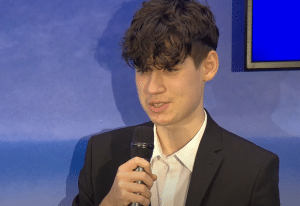 “I feel national school campaigns on climate change awareness can be a big factor in the younger generation learning about what impacts they have on the climate and how they can help mitigate and stop climate change,” Toma told other members of the five-strong panel and the assembled audience in Glasgow.
“I feel national school campaigns on climate change awareness can be a big factor in the younger generation learning about what impacts they have on the climate and how they can help mitigate and stop climate change,” Toma told other members of the five-strong panel and the assembled audience in Glasgow.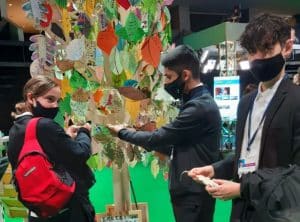 Reflecting on his experience after returning to School, Toma said that being at COP 26 with delegates and leaders from around the world was “surreal”, but noted that there were “lots of different people with the same ambitions”. Asked about the prevailing mood, Toma said: “People were secretly optimistic, outwardly expecting the worst, but hoping for the best.”
Reflecting on his experience after returning to School, Toma said that being at COP 26 with delegates and leaders from around the world was “surreal”, but noted that there were “lots of different people with the same ambitions”. Asked about the prevailing mood, Toma said: “People were secretly optimistic, outwardly expecting the worst, but hoping for the best.”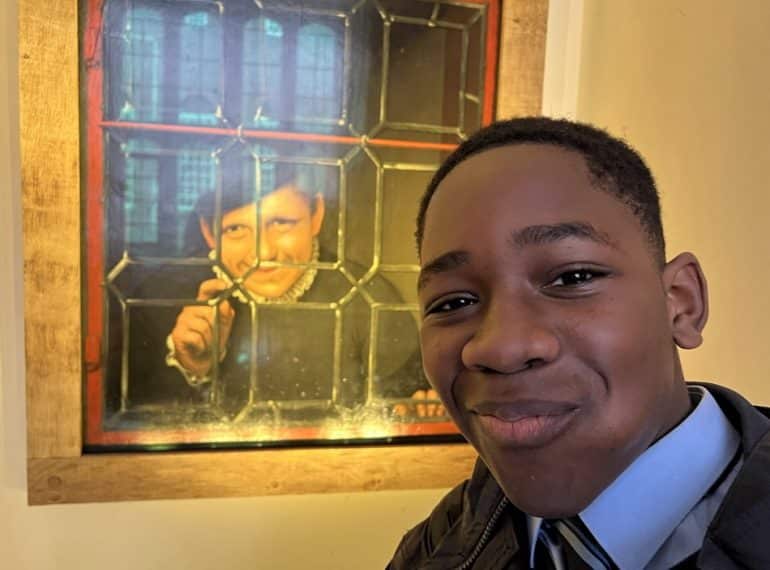
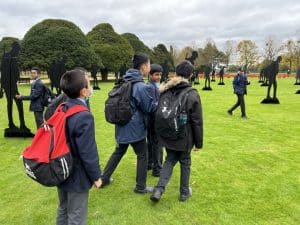 At the palace, the boys learned about Tudor life and saw at first-hand evidence of the School’s own links with the Tudor monarchy. They also had the opportunity to see a special exhibition and art installation – on for this month only – featuring silhouetted figures of Sikh soldiers from the British Empire’s Indian Army.
At the palace, the boys learned about Tudor life and saw at first-hand evidence of the School’s own links with the Tudor monarchy. They also had the opportunity to see a special exhibition and art installation – on for this month only – featuring silhouetted figures of Sikh soldiers from the British Empire’s Indian Army.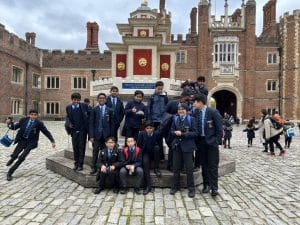 “Our pupils were fascinated, too, by the carved wooden ceilings in the Great Hall, picturing to themselves Henry VIII sitting under them and also, a few decades later, performances there by Shakespeare’s own theatre company.
“Our pupils were fascinated, too, by the carved wooden ceilings in the Great Hall, picturing to themselves Henry VIII sitting under them and also, a few decades later, performances there by Shakespeare’s own theatre company.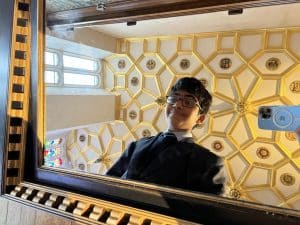 Braving the chilly weather, the QE groups enjoyed a walk around the park and formal gardens, during which they spied a herd of deer across a water feature to the rear of the palace.
Braving the chilly weather, the QE groups enjoyed a walk around the park and formal gardens, during which they spied a herd of deer across a water feature to the rear of the palace.
 One undoubted highlight was the online assembly given to the Sixth Form by Roni Savage (pictured above) – engineering geologist, founder of a multi-million pound construction industry consultancy, multiple award-winner…and a QE mum.
One undoubted highlight was the online assembly given to the Sixth Form by Roni Savage (pictured above) – engineering geologist, founder of a multi-million pound construction industry consultancy, multiple award-winner…and a QE mum. Mrs Savage, whose son, Jayden, is in Year 13, is the founder of Jomas Associates, a large engineering and environmental consultancy, and Policy Chair for Construction within the Federation of Small Businesses. She is a Fellow of both the Royal British Institute of Architects and the Institute of Civil Engineering, and is on the current UK Powerlist of Britain’s most influential people of African/Caribbean heritage.
Mrs Savage, whose son, Jayden, is in Year 13, is the founder of Jomas Associates, a large engineering and environmental consultancy, and Policy Chair for Construction within the Federation of Small Businesses. She is a Fellow of both the Royal British Institute of Architects and the Institute of Civil Engineering, and is on the current UK Powerlist of Britain’s most influential people of African/Caribbean heritage.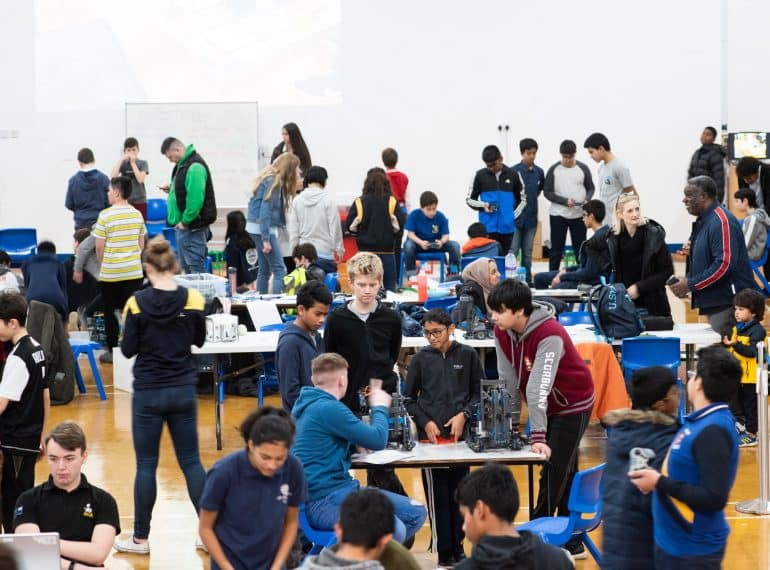
 Head of Technology Michael Noonan said: “By the time they reached this competition, the boys definitely had the right mindset and the right strategy, having drawn on their past experience of robotics to develop a robot capable of taking on this season’s challenge. They handled the pressure on the day well and rightfully enjoyed the celebrations after their victory.”
Head of Technology Michael Noonan said: “By the time they reached this competition, the boys definitely had the right mindset and the right strategy, having drawn on their past experience of robotics to develop a robot capable of taking on this season’s challenge. They handled the pressure on the day well and rightfully enjoyed the celebrations after their victory.”
 ast drawn from Year 9 performed the play to their year group classmates in the morning and then again to parents, staff and visitors after school.
ast drawn from Year 9 performed the play to their year group classmates in the morning and then again to parents, staff and visitors after school.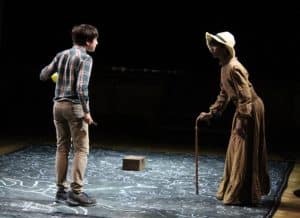 Based on Mark Haddon’s award-winning novel, the moving, darkly comic, and ultimately inspiring story centres on the challenges a boy with autism faces in navigating the world. It also explores themes of family breakdown and the mystery of who killed Wellington, the eponymous dog.
Based on Mark Haddon’s award-winning novel, the moving, darkly comic, and ultimately inspiring story centres on the challenges a boy with autism faces in navigating the world. It also explores themes of family breakdown and the mystery of who killed Wellington, the eponymous dog. “The cast, technical crew and director were also brilliant, with the performance ‘in the round’ really drawing the audience into the heart of the action. The staging was particularly effective and was aided by the great work on the sound and lighting by Old Elizabethan Chris Newton, of School Stage.
“The cast, technical crew and director were also brilliant, with the performance ‘in the round’ really drawing the audience into the heart of the action. The staging was particularly effective and was aided by the great work on the sound and lighting by Old Elizabethan Chris Newton, of School Stage.